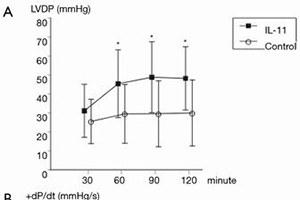The cardioprotective effect of interleukin-11 against ischemia- reperfusion injury in a heart donor model
Abstract
Background: Previously, we have demonstrated the cardioprotective effect of interleukin (IL)-11 in animal models of acute coronary syndrome. In this study, we sought to evaluate its cardioprotective potential during prolonged hypothermic global ischemia and subsequent reperfusion using a rat heart donor model.
Methods: IL-11 was administered intravenously 10 minutes before harvesting the rat heart. The hearts were preserved in cold (4 ℃) Krebs-Henseleit buffer for 6 hours, and then attached to a Langendorff perfusion apparatus and reperfused with an oxygenated Krebs-Henseleit solution containing IL-11. Normal saline was used instead of IL-11 in the control group. Functional recovery of the reperfused heart was observed by using a left ventricular balloon. Myocardial cell injury was quantified by measuring the biomarkers collected from the coronary effluent. Apoptotic cells were identified and counted using the terminal deoxynucleotide transferase-mediated dUTP nick-end labeling (TUNEL) staining technique.
Results: IL-11 administration improved myocardial function after 6 hours of cold ischemia. Although there were no significant differences in any of the baseline-measured values between the two groups, left ventricular developed pressure (LVDP) and changes in left ventricular pressures (dP/dt) were significantly higher in the IL-11 group at 120-minute reperfusion. The number of TUNEL-labeled cardiomyocytes was also significantly smaller in the IL-11 group.
Conclusions: The administration of IL-11 showed a significant recovery of cardiac contractile function after 6 hours of cold ischemia. Our data suggest that it may have significant therapeutic potential for maintaining the functional viability of the heart exposed to prolonged hypothermic global ischemia.
Cover






